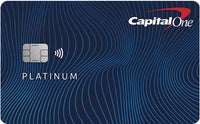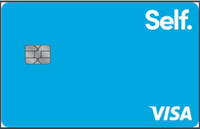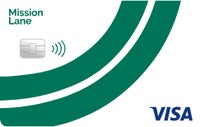Best credit cards for a 500 credit score (or less)

Having a credit score of 500 or less does limit your options when it comes to credit cards, but it doesn’t fully exclude you from qualifying for a good one. Several credit cards designed for credit scores in this range or lower offer credit-building tools to help you build your score; some even offer rewards. The cards featured here could get you on the right track to earn a better score and better cards.
Top cards for a credit score of 500 or lower

Capital One Platinum Secured Credit Card
-
The Capital One Platinum Secured Credit Card is a great starter credit card for people who want to access credit with a low security deposit. If you have bad credit or no credit, it’s a great choice because you may be eligible for a $49 security deposit ($99 or $200 minimum deposit possible, depending on your credit score), which is much lower than the deposit required on other cards designed for a credit score lower than 500.

Discover it® Secured Credit Card
-
The Discover it® Secured Credit Card is perhaps the best card on this list for anyone who can afford a $200 security deposit because it also earns rewards and a welcome offer. You’ll rarely find a card in this credit score range that earns cash back for your purchases or carries a welcome offer, so it’s worth jumping at what this card offers if you have the money to deposit.

The secured Self Visa® Credit Card1
-
The secured Self Visa® Credit Card1 is a unique card in the bad credit space. Not only does it come without an interest rate, it now only requires a minimum deposit of $100.
If you prefer not to put down $100 to open the card, you can use a Self Credit Builder Account to eventually fund the security deposit. That account is similar to a credit-builder loan, which gives the cardholder both a credit card and a loan under their name. While this can be daunting, it’s a low-risk way to build credit faster than a more traditional credit card.

Petal 2 Visa® Credit Card
-
The Petal 2 Visa® Credit Card* skips several credit card fees and earns a decent rate of cash back, with the chance to boost your rewards rate with responsible card use. If you’re building credit and want to have some external motivation outside of your own discipline, this card’s rewards program can incentivize you to use credit responsibly while you raise your score.

Mission Lane Green Line Visa® Credit Card
-
The Mission Lane Green Line Visa® Credit Card* charges an annual fee of up to $59 but skips the security deposit, making it a fairly affordable option for anyone with a credit score under 500. Security deposits are often expensive hurdles when accessing credit, but cards like this make a line of credit available with minimal financial commitment. This initial fee will dig into your credit limit, but cardholders have the opportunity for a credit line increase (See terms).
Comparing the best cards for a 500 credit score
| Card name | Best for | Annual fee | Security deposit | Recommended credit score |
|---|---|---|---|---|
| Capital One Platinum Secured Credit Card | Low security deposit | $0 | Your minimum security deposit amount will be either $49, $99 or $200 | No credit history |
| Discover it® Secured Credit Card | Rewards | $0 | $200 | No credit history |
| The secured Self Visa® Credit Card1 | A credit mix | $0 annual fee for the first year only, $25 annual fee thereafter. | $100 | No credit history |
| Petal 2 Visa® Credit Card* | Avoiding fees | $0 | None | No credit history |
| Mission Lane Green Line Visa® Credit Card* | No security deposit | $0 - $59 | None |
Fair/Bad Credit |
How to choose a credit card for bad credit
Cards for bad credit tend to have very few benefits for consumers and can be a bit pricey when it comes to fees. However, some are more beneficial than others so you’ll want to keep an eye out for a few key features:
Free credit reports
Knowing your credit score can help you navigate the cards you qualify for and help you avoid behaviors that could damage your score, like applying for too many credit cards at once. You can access your credit score for free through the three credit bureaus but it’s definitely a bonus if your card issuer provides it.
Minimal fees
Issuers often require a security deposit upfront to open a new secured credit card for bad credit. This collateral is a refundable amount used to fund your credit limit; other cards may charge annual fees, which are non-refundable.
Credit cards for bad credit also tend to have high ongoing APRs and rarely have intro APR offers. The best credit cards for bad credit have either a reasonable annual fee or a reasonable security deposit, a lower ongoing APR and plenty of credit-building incentives.
Avoid cards that have a ton of fees just for use (ATM fees, low balance fees, monthly fees, etc.) as these fees can quickly add up and you could pay more than what you would even pay on some premium credit cards.
Credit-building features
An advantage of credit cards for bad to fair credit scores is the potential to help you build an even better score over time. Here’s a few things you should always look for:
- Your card reports to the major credit bureaus, which ensures there is a record of your progress.
- It includes incentives for positive credit habits, like credit limit increases.
- The issuer offers the chance to graduate from your card to a more lucrative secured or unsecured credit card.
How to improve bad credit
The more you can improve your credit score, the better your chances are of accessing higher-quality cards. As a lower-risk borrower, you won’t have to spend as much on the collateral requirements for cards geared toward people with 500 credit scores or lower. There are a few easy habits that can help you improve your credit score over time. Consider doing the following:
- Always pay on time. Set reminders on your calendar or set up automatic payments to ensure you never get hit with late fees or negative marks on your report for paying late.
- Watch your credit report. See what’s making your score increase and decrease over time and adjust your credit habits accordingly.
- Pay off your balance in full. Paying in full makes sure you avoid interest and keeps your credit utilization ratio low.
While these tips are simple, they can go a long way in helping you get a better score and get better credit cards in the future. So, make sure you keep an eye on your credit report over time and see where you can improve as you grow in your credit journey.
What’s next?
The bottom line
Don’t think a low credit score leaves you out for the count on accessing decent credit cards. You may not get the most lucrative rewards rates and lowest fees, but you can build your way to better cards with responsible habits.
Be sure to pick a card that reports your progress to the major credit bureaus, never miss a payment and keep your credit utilization low. These steps can lead you in the right direction when done consistently over time.
Frequently asked questions about cards for a 500 credit score
*The information about the Petal 2 Visa® Credit Card and Mission Lane Green Line Visa® Credit Card has been collected independently by Bankrate. The card details have not been reviewed or approved by the issuer.
Why we ask for feedback Your feedback helps us improve our content and services. It takes less than a minute to complete.
Your responses are anonymous and will only be used for improving our website.





